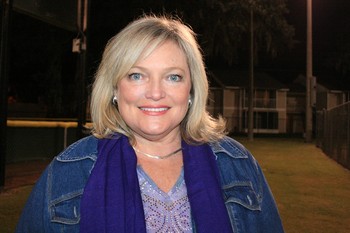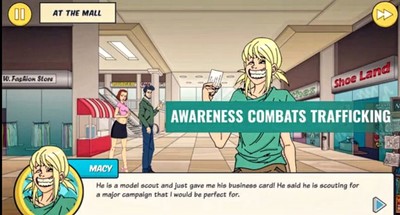An interactive, anime-style gaming app for mobile devices like smartphones and tablets has an extraordinary mission: to keep children and young adults, ages 11 to 14, from becoming victims of human traffickers.
After two years in development, the Awareness Combats Trafficking (ACT) app will be available for free download in English and Spanish through iOS app store, Google Play, and Lifeboat-ACT.com, beginning February 21.
The ACT app is the brainchild of lifelong Presbyterian Jill Bolander Cohen, founder and executive director of the Lifeboat Project, a Central Florida nonprofit that works to fight human trafficking and is a recent addition to the 1001 New Worshiping Communities initiative of the PC(USA). It’s designed to educate junior high and high school students about the dangerous, ever-changing schemes of traffickers.
“Based on calls to the National Trafficking Hotline, Florida ranks third in the nation for trafficking, and my church sits about two minutes from one of the most heavily trafficked parts of our state,” Cohen says.
The Lifeboat Project received support from the U.S. Department of Defense to create the main framework and philanthropists stepped forward to develop the gaming app through Orlando-based Engineering and Computer Simulation (ECS). It has been well received by educators and students who took part in beta testing and has already won two silver awards in the categories of education and gaming, presented by Horizon Interactive Awards.

Jill Bolander Cohen, founder and executive director of the Lifeboat Project. —Photo provided
“We’re so excited about the rollout of this app,” Cohen says. “Even in its early stages it is gaining the attention of legislators and educators across Florida and around the country.”
Cohen says, the Lifeboat Project and ECS have had meetings in several agencies in Washington, D.C., including the Department of Health and Human Services, Department of Justice Office for Victims of Crime, Department of Education and The White House. “All agencies felt the ACT app is one of the best tools in educating our children about human trafficking,” she says. On average, Cohen says, teens and preteens spend about 53 hours a week on mobile devices such as smartphones and tablets.
In the first vignette, a teenager named Macy faces an all too common occurrence where a young girl is tricked into being trafficked by a seemingly legitimate modeling scout. The objective of the game is for the player to recognize and correctly identify clues or “red flags” that could indicate trafficking may be occurring. Cohen says developers worked to strike a balance that isn’t “too broad” or “too scary,” but one in which the students learn from the characters’ stories to be alert and aware at all times.
Players can click and expand on areas of the scene (hotspots) that seem suspicious to learn more and sleuth out the red flags. If a player is unsure if an object is normal or a red flag, lifelines can be used to consult a human trafficking reference library or to get facts and opinions from a player’s classmate or a police officer who is also a family friend. Not all hotspots are red flags.
In order to advance to the next scene, a player must correctly identify all the red flag hotspots. If any red flags are missed, the player will have to play through the scene again until the suspicious objects have been identified as red flags. Each red flag has a specific learning objective.
“So far 12 counties in Florida have committed to put the gaming app in their curriculum,” Cohen says. “Our hope for the app is not only to bring prevention and awareness, but to leverage businesses using the app to help fund long-term housing and care for survivors.”
“As traffickers change their tactics,” she says, “We hope to stay 10 steps ahead of them by developing new scenes to educate our ‘digital natives,’ our youth.”
On March 16 at 8:30 a.m. Cohen will offer a parallel event about the ACT app at the Church Center for the United Nations as part of the nongovernmental organization Committee on the Status of Women’s Forum. The Forum coincides with the 60th session of the United Nations Commission on the Status of Women held March 14-24, 2016. The Presbyterian Ministry at the United Nations, in partnership with Racial Ethnic & Women’s Ministries and Presbyterian Women in the Presbyterian Church (U.S.A.), coordinates the Presbyterian participation in the Commission on the Status of Women and the Forum.
For more information, visit thelifeboatproject.org, email thelifeboatproject@gmail.com or download the informational flier.
-----
If you suspect the crime of human trafficking, call the National Human Trafficking Resource Center Hotline at 888-373-7888. The center can help you determine if you have encountered a victim of trafficking and can coordinate with law enforcement and social service agencies to help the victim.

